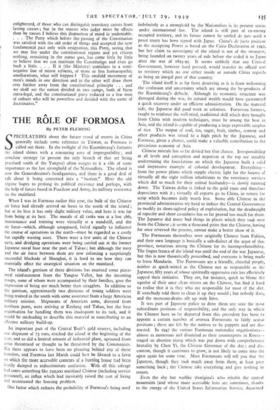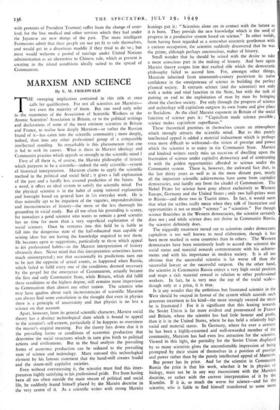THE ROLE OF FORMOSA By PETER FLEMING
SPECULATIONS about the future trend of events in China generally include some reference to Taiwan, as Formosa is called out there. In the twilight of the Kuomintang's fortunes the island shines with a reassuring aura of impregnability ; and armchair strategy (at present the only branch of that art being practised south of the Yangtse) often assigns to it a role of some importance as the last stronghold of the Nationalists. The island is now the Generalissimo's headquarters, and there is a good deal of talk about it being converted into a "bastion." Here the old regime hopes to prolong its political existence and perhaps, with the help of forces based in Foochow and Amoy, its military resistance on the mainland.
When I was in Formosa earlier this year, the bulk of the Chinese air force had already arrived on bases in the south of the island ; hut at its best it has only slight military value, and here it was far from being at its best. The morale of all ranks was at a low ebb, maintenance and training were virtually at a standstill, and the air force—which, although unopposed, failed signally to influence the course of operations in the north—must be regarded as a costly but rapidly wasting asset. There were a few units of the Chinese navy, and dredging operations were being carried out at the former Japanese naval base near the port of Takao ; but although the navy and the air force between them are now enforcing a surprisingly successful blockade of Shanghai, it is hard to see how they can materially affect the strategical situation on the mainland.
The island's _garrison of three divisions has received some piece- meal reinforcement from the Yangtse Valley, but the incoming troops, some of whom were accompanied by their families, gave the impression of being not much better than stragglers. In addition to the garrison, approximately two divisions of young soldiers were being trained in the south with some assistance from a large American military mission. Shipments of American arms, diverted from northern ports, were arriving at Keelung and Takao, but the base organisation for handling them was inadequate to its task, and it would be misleading to describe this material as contributing to an effective military build-up.
An important part of the Central Bank's gold reserve, including one shipment of 73 tons, reached the island at the beginning of the year, and so did a limited amount of industrial plant, uprooted from areas threatened or thought to be threatened by the Communists. But there appears to have been no planning behind any of these transfers, and Formosa last March could best be likened to a lawn on which thc more accessible contents of a burning house had been hastily dumped in indiscriminate confusion. With all this salvage had come something like 250,000 mainland Chinese (including service Personnel), an influx which had inevitably raised the cost of living
and accentuated the housing problem. . One factor which reduces the probability of Formosa's being used
indefinitely as a stronghold by the Nationalists is its present status under international law. The island is still part of ex-enemy occupied territory, and its future cannot be settled de jure until a peace treaty has been signed with Japan. China's de facto position as the occupying Power is based on the Cairo Declaration of 1942, but her claim to sovereignty of the island is not of the strongest, being founded on twenty years of rule before she ceded it to Japan after the war of 1894-95. It seems unlikely that any Central Government, however hard pressed, would transfer its official seat to territory which no one either inside or outside China regards as being an integal part of that country.
The island itself is as far from deserving as it is from welcoming the confusion and uncertainty which are among the by-products of the Kuomintang's- debacle. Although its economic structure was damaged during the war, its natural wealth would have guaranteed a quick recovery under an efficient administration. On the material side, the Japanese did good work as colonists. Formosan farmers, taught to reinforce the well-tried, traditional skill which they brought from China with modern techniques, must be among the best in Asia, and the island is capable of producing a large exportable surplus of rice. The output of coal, tea, sugar, fruit, timber, cement and other products was raised to a high pitch by the Japanese, and Formosa, given a chance, could make a valuable contribution to the precarious economy of Asia.
Chinese misrule has so far denied her that chance. Irresponsibility at all levels and corruption and nepotism at the top are steadily undermining the foundations on which the Japanese built a solid and impressive example of colonial development. Everything— from the power plants which supply electric light for the houses of virtually 311 the eight million inhabitants to the veterinary services which did so much for their animal husbandry—is slowly running down. The Taiwan dollar is linked to the gold yuan and therefore depreciates with it ; virtually all exports go to China, in return for scrip which becomes daily worth less. Some able Chinese in the provincial administration try hard to induce the Central Government to modify its short-sighted policy of exploitation, but the deadweight of rapacity and sheer casualness has so far proved too much for them. The Japanese did many bad things in places which they took over from the Chinese ; it seems a thousand pities that the Chinese, having for once reversed the process, cannot make a better show of it.
The Formosans themselves were originally Chinese from Fukien, and their own language is basically a sub-dialect of the argot of that province, notorious among the Chinese for its incomprehensibility. The lingua franca of the island was until the end of the war Japanese, but this is now theoretically proscribed, and everyone is being made to learn Mandarin. The Formosans are a friendly, cheerful people, neither as quick-witted as the Chinese nor as responsible as the Japanese, fifty years of whose spiritually oppressive rule has effectively sapped their initiative. They are, for instance, quick to blame the squalor of their once clean streets on the Chinese, but find it hard to realise that it is they who arc responsible for most of the dirt. If somebody told them to clean it up they would ; but nobody does, and the monsoon-drains silt up with litter.
It was part of Japanese policy to deny them any save the most subordinate positions of responsibility, and the only way in which the Chinese have so far departed from this precedent has been to appoint a certain number of oversea Formosans to fairly senior positions ; these arc felt by the natives to be puppets and are dis- trusted. In 1947 the various Formosan nationalist organisations— almost as numerous and disunited as their counterparts in Korea— staged an abortive rising which was put down with comprehensive brutality by Chen Yi, the Chinese Governor of the day ; and dis- content, though it continues to grow, is not likely to come into the open again for some time. Most Formosans will tell you that the Japanese, though they took much away from them, at least gave something back ; the Chinese take everything and give nothing in return.
Even the shy but warlike aboriginals who inhabit the central mountains (and whose more accessible huts are sometimes, thanks to the energy of the United States Information Service, decorated with portraits of President Truman) suffer from the change of over- lord, for the free medical and other services which they had under the Japanese are now things of the past. The more intelligent Formosans admit that their people are not yet fit to rule themselves, and would get in a disastrous muddle if they tried to do so ; but most would welcome a period of tutelage under United Nations administration as an alternative to Chinese rule, which at present is creating in the island conditions ideally suited to the spread of Communism.



































 Previous page
Previous page